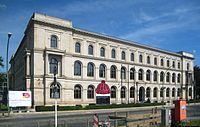Federal Ministry for Digital and Transport
| Bundesministerium für Digitales und Verkehr (BMDV) | |
 | |
 | |
| Agency overview | |
|---|---|
| Formed | 20 September 1949 |
| Jurisdiction | Government of Germany |
| Headquarters | Invalidenstraße 44, Berlin 52°31′46.58″N 13°22′42.10″E / 52.5296056°N 13.3783611°ECoordinates: 52°31′46.58″N 13°22′42.10″E / 52.5296056°N 13.3783611°E |
| Employees | 1,300 |
| Annual budget | €41.154 billion (2021)[1] |
| Minister responsible |
|
| Website | http://www.bmdv.bund.de |

Federal Ministry for Digital and Transport (German: Bundesministerium für Digitales und Verkehr, German pronunciation: [ˈbʊndəsminɪsˌteːʁiʊm fyːɐ̯ diɡiˈtaːləs ʊnt fɛɐ̯ˈkeːɐ̯]), known by its abbreviation BMDV, is a cabinet-level ministry in the Federal Republic of Germany. Its main office is situated in Berlin, while a significant number of its civil servants and staff are based in Bonn, which serves as its secondary location.
The ministry employs approximately 1,300 individuals and is led by the Federal Minister, supported by two Parliamentary Secretaries who are also Members of the Bundestag, along with two civil servant undersecretaries. It oversees 63 downstream agencies and authorities that collectively employ around 25,000 people. This agency was established by merging the former Federal Ministry of Transport and the Federal Ministry of Regional Planning, Building and Urban Development, both of which were founded in 1949. Initially, the merged entity was named the Federal Ministry of Transport, Building and Housing. In 2005, it was renamed to the Federal Ministry of Transport, Building and Urban Development (BMVBS). Following an organizational decree from the Merkel III Cabinet on December 17, 2013, it became the Federal Ministry of Transport and Digital Infrastructure (BMVI). A decree issued by Olaf Scholz upon taking office as Chancellor on December 8, 2021, resulted in the ministry adopting its current name.
After the reunification of Germany, politicians from the new federal states frequently led the ministry due to its significant role in restoring the deteriorating infrastructure inherited from former East Germany. Günther Krause was the first minister appointed after the 1990 German federal election. Later, in 2002, Manfred Stolpe, the former Minister-President of Brandenburg, took on the role after his successor, then-Mayor of Potsdam Matthias Platzeck, declined the position in 1998. Stolpe was followed by Wolfgang Tiefensee, the then-Mayor of Leipzig, who similarly refused the role in 2002, just like Platzeck had done previously.
Notes[edit]
References[edit]
- ↑ "Bundeshaushalt". www.bundeshaushalt.de. Retrieved 10 May 2021.